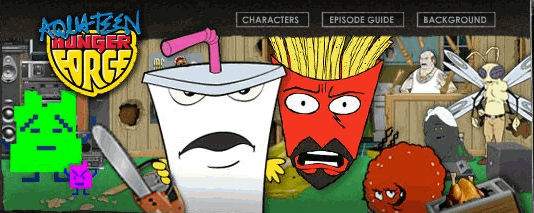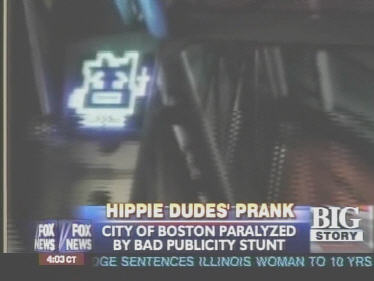
Dynamics

|
Generational Dynamics |
| Forecasting America's Destiny ... and the World's | |
| HOME WEB LOG COUNTRY WIKI COMMENT FORUM DOWNLOADS ABOUT | |
In a media event reminiscent of Orson Welles' 1938 "War of the Worlds" radio show, blinking neon signs representing characters in the Cartoon Network show Aqua-Teen Hunger Force were placed on Boston highways and bridges, where they were mistaken for bombs. The cartoon show characters include a talking milkshake, a box of fries and a meatball.
 |
The neon signs have been place in nine cities around the country over the past several weeks, but in Boston the signs suddenly sent a wave of panic across the city, bringing out bomb squads, and causing highways and bridges to be shut down.
 |
The hoax was revealed when the Cartoon Network called to admit it. Spokeswoman Shirley Powell said that the devices had been up for two weeks without incident. "We were simply promoting a TV show," she said. "If we had ever perceived this to be something threatening safety, we would never have proceeded with it."
In fact, the young men, aged 18-24, in the target audience of the marketing gambit seem to think the whole thing is a joke, and some ridiculed Boomers for falling for it.
Popular Boston Herald columnist Howie Carr quoted one young person as saying, "Anyone under the age of 35 knew this was a joke the minute they saw it."
Tobe Berkowitz, an advertising professor at Boston University, said that it's easy to understand why there is a generational gap. "For people who are hip and live in the world of blogs and all sorts of cool alternative media, it's one thing," he said. "But for the rest of us ... they don't get it as a marketing or a clever event, they see it as a huge disruption of their lives."
The Boston Globe found that the marketing ploy "exposed a wide generation gap" among the citizens of Boston.
One 22-year-old design student said he first saw them two weeks ago. "I knew it was art, and I knew it was part of the [cartoon show] ads, because I saw a billboard for the same thing. I see it in New York all the time."
A local 29-year-old blogger wrote sarcastically, "Repeat after me, authorities. L-E-D. Not I-E-D. Get it?" (An LED is a "light emitting diode," commonly used in digital clocks; an IED is an "improvised explosive device" of a kind used in roadside bombs by Iraqi terrorists.)
So those of us in the Boomer generation just have to suffer more ridicule and abuse, I guess.
But from the point of view of Generational Dynamics, this illustrates the tension and anxiety present in a generational Crisis era. If these devices had been planted ten years ago, no one would have cared, and any hint that they were bombs would have been treated as ridiculous.
The reaction to the blinking signs is an example of mass hysteria, and the best example of that is Orson Welles' 1938 radio adaptation of H. G. Wells' story, War of the Worlds.
Today's America is like 1938 America in many ways. In both cases it's a generational Crisis era. Today American's are anxious about terrorism and the economy.
Americans were also very anxious in 1938, as they were still in the depths of the Great Depression. Radios were selling at a record pace, as Hitler was rallying his forces in Europe, having already taken control of the Sudetenland area in Czechoslovakia. On the other side of the world, the Japanese had invaded China and were in the process of taking over. Many Americans were extremely anxious about war.
In this atmosphere, the radio program appeared to be a music program interrupted by news bulletins reporting on an invasion of Martians in cities around the country. Although announcements during the program informed listeners that it was fiction, tens or hundreds of thousands of listeners panicked, believing that a real invasion was taking place. A substantial minority believed that it was a German invasion rather than a Martian invasion.
This is a good example of mass hysteria, because it illustrates how large masses of people can react irrationally to threats of war during crisis periods. If that much panic occurred among a relatively few listeners to a radio program describing a fictional event, imagine how much greater the panic would have been if the story had been about a REAL German or Japanese invasion.
Mass hysteria can occur in other than generational Crisis eras. The well-known 1692 Salem witchcraft trials occurred during a generational Awakening period, when four teenage girls appeared to have epileptic fits, and accused several neighbors of witchcraft. By the time it was all over, dozens of people had been jailed and 20 had died.
You can also see mass hysteria in something as ordinary as rock concerts, for Frank Sinatra in the 1940s or the Beatles in the 1960s, where young girls are the main actors screaming at every word.
Young girls and women, especially when grouped in schools or social circles, are highly susceptible to mass hysteria. Men are much less susceptible because they're much less social, but they do become "infected" by the women in their lives, or by unambiguous violence or threats of violence.
So mass hysteria can occur at any time, during any generational era. But it's especially important during generational Crisis eras because it can lead to war.
Last summer's Lebanon war between Israel and Hizbollah was a tragedy for all involved, but it's provided a wealth of insight and information for Generational Dynamics. In this case, the Hizbollah missiles coming from Lebanon caused a nationwide panic among the Israelis that led them to go to war within four hours with no clear plan or objective. In the end, the war was a disaster.
There are people who believe that Americans have somehow "recovered" from 9/11, and that we're no longer anxious and concerned about terrorism. Nothing could be farther from the truth.
In fact, the opposite is happening, as more and more WW II survivors disappear, leaving the world to be run by Boomers who have no skills at doing anything but arguing. Americans panicked at Orson Welles' War of the Worlds in 1938, and Bostonians panicked at neon cartoons on Wednesday.
Now imagine how Americans will react if there are REAL terrorist bombs involved. Don't think that Americans won't panic in an instant; it happened this week in Boston, and in Israel last summer. It can happen again at any time, and it can lead to war.
And it can happen to any of the countries that fought in World War
II, since all of these countries are now in generational Crisis eras.
That's how crisis wars get started.
(2-Feb-07)
Permanent Link
Receive daily World View columns by e-mail
Donate to Generational Dynamics via PayPal
Web Log Summary - 2016
Web Log Summary - 2015
Web Log Summary - 2014
Web Log Summary - 2013
Web Log Summary - 2012
Web Log Summary - 2011
Web Log Summary - 2010
Web Log Summary - 2009
Web Log Summary - 2008
Web Log Summary - 2007
Web Log Summary - 2006
Web Log Summary - 2005
Web Log Summary - 2004
Web Log - December, 2016
Web Log - November, 2016
Web Log - October, 2016
Web Log - September, 2016
Web Log - August, 2016
Web Log - July, 2016
Web Log - June, 2016
Web Log - May, 2016
Web Log - April, 2016
Web Log - March, 2016
Web Log - February, 2016
Web Log - January, 2016
Web Log - December, 2015
Web Log - November, 2015
Web Log - October, 2015
Web Log - September, 2015
Web Log - August, 2015
Web Log - July, 2015
Web Log - June, 2015
Web Log - May, 2015
Web Log - April, 2015
Web Log - March, 2015
Web Log - February, 2015
Web Log - January, 2015
Web Log - December, 2014
Web Log - November, 2014
Web Log - October, 2014
Web Log - September, 2014
Web Log - August, 2014
Web Log - July, 2014
Web Log - June, 2014
Web Log - May, 2014
Web Log - April, 2014
Web Log - March, 2014
Web Log - February, 2014
Web Log - January, 2014
Web Log - December, 2013
Web Log - November, 2013
Web Log - October, 2013
Web Log - September, 2013
Web Log - August, 2013
Web Log - July, 2013
Web Log - June, 2013
Web Log - May, 2013
Web Log - April, 2013
Web Log - March, 2013
Web Log - February, 2013
Web Log - January, 2013
Web Log - December, 2012
Web Log - November, 2012
Web Log - October, 2012
Web Log - September, 2012
Web Log - August, 2012
Web Log - July, 2012
Web Log - June, 2012
Web Log - May, 2012
Web Log - April, 2012
Web Log - March, 2012
Web Log - February, 2012
Web Log - January, 2012
Web Log - December, 2011
Web Log - November, 2011
Web Log - October, 2011
Web Log - September, 2011
Web Log - August, 2011
Web Log - July, 2011
Web Log - June, 2011
Web Log - May, 2011
Web Log - April, 2011
Web Log - March, 2011
Web Log - February, 2011
Web Log - January, 2011
Web Log - December, 2010
Web Log - November, 2010
Web Log - October, 2010
Web Log - September, 2010
Web Log - August, 2010
Web Log - July, 2010
Web Log - June, 2010
Web Log - May, 2010
Web Log - April, 2010
Web Log - March, 2010
Web Log - February, 2010
Web Log - January, 2010
Web Log - December, 2009
Web Log - November, 2009
Web Log - October, 2009
Web Log - September, 2009
Web Log - August, 2009
Web Log - July, 2009
Web Log - June, 2009
Web Log - May, 2009
Web Log - April, 2009
Web Log - March, 2009
Web Log - February, 2009
Web Log - January, 2009
Web Log - December, 2008
Web Log - November, 2008
Web Log - October, 2008
Web Log - September, 2008
Web Log - August, 2008
Web Log - July, 2008
Web Log - June, 2008
Web Log - May, 2008
Web Log - April, 2008
Web Log - March, 2008
Web Log - February, 2008
Web Log - January, 2008
Web Log - December, 2007
Web Log - November, 2007
Web Log - October, 2007
Web Log - September, 2007
Web Log - August, 2007
Web Log - July, 2007
Web Log - June, 2007
Web Log - May, 2007
Web Log - April, 2007
Web Log - March, 2007
Web Log - February, 2007
Web Log - January, 2007
Web Log - December, 2006
Web Log - November, 2006
Web Log - October, 2006
Web Log - September, 2006
Web Log - August, 2006
Web Log - July, 2006
Web Log - June, 2006
Web Log - May, 2006
Web Log - April, 2006
Web Log - March, 2006
Web Log - February, 2006
Web Log - January, 2006
Web Log - December, 2005
Web Log - November, 2005
Web Log - October, 2005
Web Log - September, 2005
Web Log - August, 2005
Web Log - July, 2005
Web Log - June, 2005
Web Log - May, 2005
Web Log - April, 2005
Web Log - March, 2005
Web Log - February, 2005
Web Log - January, 2005
Web Log - December, 2004
Web Log - November, 2004
Web Log - October, 2004
Web Log - September, 2004
Web Log - August, 2004
Web Log - July, 2004
Web Log - June, 2004